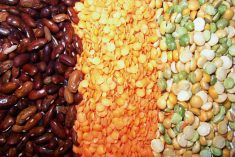A coalition of corn producer groups in Ontario, Quebec and Manitoba that challenged imports of U.S. grain corn in 2005 has decided not to try for one last appeal of the ruling that those imports don’t injure Canadian corn growers.
Canadian Corn Producers, which last year lost its trade challenge when the Canadian International Trade Tribunal ruled in April that U.S. imports don’t cause injury to domestic producers, said it won’t seek leave to appeal that decision to the Supreme Court of Canada.
The growers’ groups, which pressed their case last year despite objections from livestock producer groups that rely on corn for feed, lost a previous appeal in June this year at the Federal Court of Canada.
Read Also

Senft to step down as CEO of Seeds Canada
Barry Senft, the founding CEO of the five-year-old Seeds Canada organization is stepping down as of January 2026.
Although the Federal Court decision was “disappointing and unfortunate, we have made the business decision not to take any further legal action at this time,” said Ryan Brown, general manager of the Ontario Corn Producers’ Association, adding that “we still believe that last year the CITT got it horribly wrong.”
The CITT’s no-injury finding came after the Canada Border Services Agency ruled in 2005 that “virtually all” U.S. grain corn imports were dumped (that is, sold below cost of production) and subsidized. Preliminary duties of US$1.65 per bushel, collected starting in December 2005, had to be returned after the CITT’s ruling.
The corn growers’ groups, however, noted that within three days of the Federal Court decision, the federal government announced it would request a panel at the World Trade Organization (WTO) to investigate U.S. ag subsidies.
Manitoba Corn Growers Association secretary-manager Theresa Bergsma noted in a statement that Brazil took the first step toward its own WTO challenge of U.S. subsidies in July.
“Supporting Canada using its international trade rights at the WTO to combat trade-distorting U.S. farm subsidies has been part of CCP’s multi-pronged strategy for over two years,” the groups said in a release, noting they would also press for the federal government to apply domestic trade remedy laws and to provide Canadian farmers with relief from U.S. subsidies through WTO-compliant safety net programs.


















